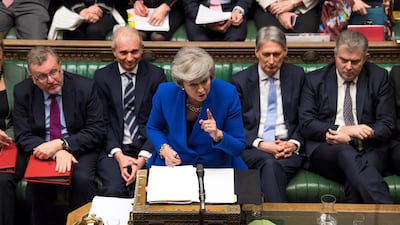The British government said on Monday it would send a formal request to the EU to extend the date of Brexit from the current March 29 deadline.
The announcement came after Theresa May was handed a new political conundrum on Monday as the government faced a "major constitutional crisis" over another vote on the Brexit withdrawal deal.
The latest blow to Mrs May, who has seen the agreement she negotiated with Brussels rejected twice by the House of Commons, came when the body's speaker said another vote on the same measure would be against the standing rules of parliament. He cited precedents going back to 1602 in a statement from the chair.
Mrs May had been negotiating with dissidents on the measure hoping to get a new attempt tabled on Tuesday ahead of an EU summit in Brussels at the end of the week.
What options remain for the British prime minister?
Parliament voted last week to rule out no-deal or abrupt crash out of the EU on March 29 as a matter of government policy. It must pass Mrs May's deal or the 27 other members of the EU must agree to postpone the date of departure to allow for an agreed way forward to be adopted. In any event the request for a delay is now the best way to avoid a chaotic Brexit at the end of month.
Won't the EU be happy to give London more time?
It is far from certain this delay can be delivered in a matter of days. First Mrs May must travel to Brussels with a clear and viable reason for a delay.
Yet she has not reached a point of clarity on what she would use the extra time to achieve. She is instead bogged down in domestic parliamentary manoeuvres. The task of trashing out a game plan to present to the other EU leaders remains a work in progress.
Mrs May has mishandled other key European summits and heads of government have turned against her during the meetings. A delay requires consensus from the 27 and only one holdout would prevent an extension of the timetable.
What purpose would a delay serve?
The British government has said a "technical" delay is likely to ensure that laws are passed and arrangements put in place for an orderly Brexit. This means the delay could be as sort as two months. However that assumes that parliament would at the last minute pass the withdrawal agreement she trashed out with the EU.
If Mrs May cannot convince other EU leaders that this short extension would tie up loose ends, the summit in Brussels could decide to reject the period of extra time.
The alternative open to Mrs May is that she asks for a longer time horizon, perhaps until the end of the already established transition period at the end of 2020. The EU has already agreed to treat the UK as if it remains a member during the transition.
Surely the EU would be happy for the UK to stay longer?
A short extension would be least disruptive for the EU as a whole. If the UK stays beyond June it will have to hold elections for MEPs to the European parliament. This would upset the calculations of how the leadership of the EU will change in the second half of the year.
There is no guarantee that even with a long extension that the UK will be able to forge its own political consensus about the shape of Brexit. The fundamental divide about the UK's future economic alignment with the EU remains polarised three ways between those who want to remain, those who want a close set-up like a shared customs union and those who want a clean break.
What are the opportunities in a long delay?
The economic underperformance of the British economy since the 2016 referendum has sowed some doubts about the risk of a so-called hard Brexit. A new time frame would avoid a sudden and damaging break-up. A one-year or more extension could grant time for a second vote on the whole project. Voters could be presented with a choice between Mrs May's withdrawal deal (or another negotiated settlement) and leaving immediately.
Can Mrs May survive these political challenges?
Not a given. Already leading a minority government -- the Conservative Party fell short in the 2017 general election -- Mrs May has virtually no room for political brinkmanship. She has spent recent days locked in talks with the Democratic Unionist Party (DUP), which has 10 MPs and props up her government.
A good indication of the knife edge in parliament is the vote she won last week by 314-312 on MPs gaining control of Brexit to dictate an new way forward.
A large section of her own party hungers for her resignation. Any move she made to embrace a closer relationship with the EU would split the cabinet with possibly fatal consequences for her own prime ministership.


